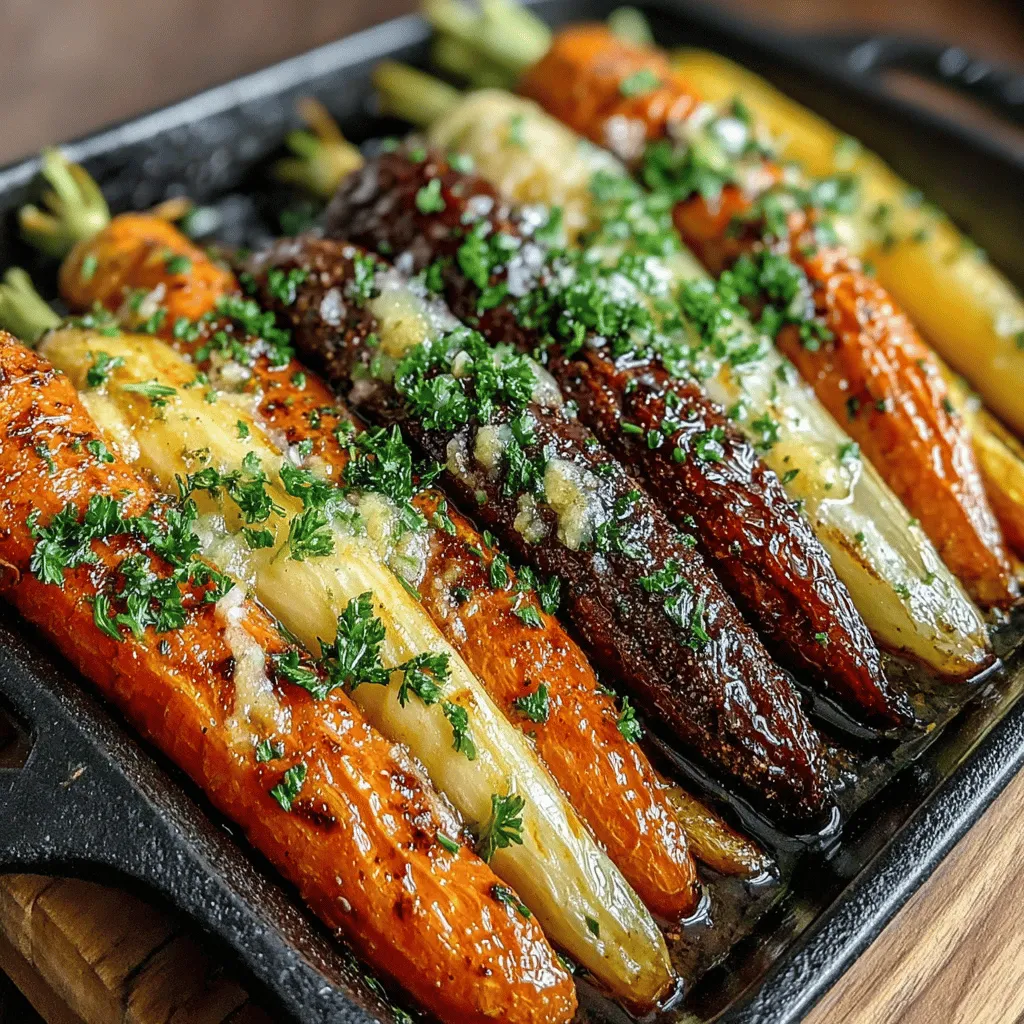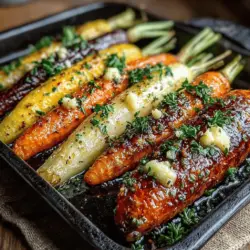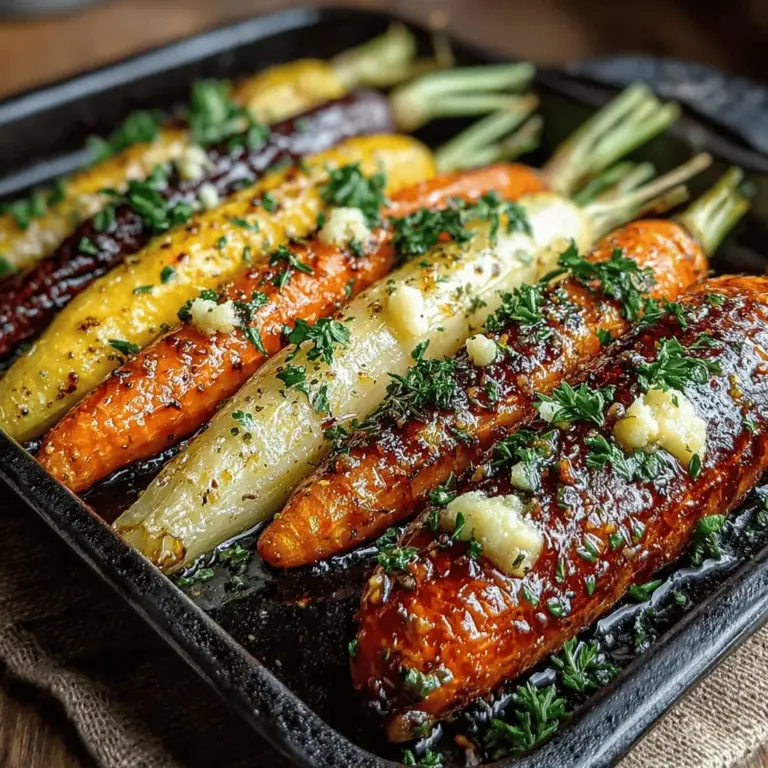Sweet Harmony: Maple-Glazed Carrots & Parsnips
As the seasons shift and the air grows crisp, the allure of root vegetables becomes undeniable. They embody the essence of autumn and winter cooking, bringing warmth, nourishment, and a comforting familiarity to our dining tables. One delightful way to celebrate these seasonal gems is through the recipe for Maple-Glazed Carrots and Parsnips. This dish not only highlights the natural sweetness of these vibrant vegetables but also infuses them with the rich, complex flavor of pure maple syrup.
The harmony created by the sweet glaze perfectly complements the earthy undertones of carrots and parsnips, resulting in a dish that is both satisfying and healthful. Whether served as a side for a holiday feast or enjoyed as a simple weeknight dinner, Maple-Glazed Carrots and Parsnips elevate any meal with their vibrant colors and enticing aromas.
In a world increasingly focused on healthy eating, this recipe stands out as a prime example of how simple ingredients can be transformed into something extraordinary. The balance of flavors, coupled with the nutritional benefits of the ingredients, makes this dish a perfect addition to any seasonal menu. Let’s delve into the ingredients that make this recipe shine and the initial steps involved in preparing this delightful dish.
Understanding the Ingredients
Carrots and Parsnips: Nutritional Benefits
Carrots and parsnips are not only delicious but also packed with essential nutrients that contribute to a balanced diet. Carrots are well-known for their high beta-carotene content, which the body converts into vitamin A. This vitamin is crucial for maintaining healthy vision, skin, and immune function. Additionally, carrots are rich in antioxidants, which help combat oxidative stress and promote overall health.
Parsnips, on the other hand, are a nutritional powerhouse in their own right. They offer a significant amount of dietary fiber, which aids in digestion and helps maintain a healthy weight. Parsnips are also a good source of vitamins C and K, as well as folate and potassium. These nutrients play vital roles in various bodily functions, including blood pressure regulation and bone health. Together, carrots and parsnips create a nutrient-dense combination that supports overall well-being while delivering delightful flavors.
Maple Syrup: A Natural Sweetener
One of the standout ingredients in this recipe is pure maple syrup, a natural sweetener that elevates the dish beyond the ordinary. Unlike refined sugars, which can lead to spikes in blood sugar levels and contribute to various health issues, maple syrup boasts a lower glycemic index, making it a better option for those mindful of their sugar intake.
Moreover, maple syrup is rich in antioxidants and contains minerals such as manganese, zinc, and calcium. These components not only enhance the flavor of the dish but also provide health benefits that refined sugars simply cannot match. The unique flavor profile of maple syrup adds a warm, toasty sweetness that beautifully complements the earthiness of the carrots and parsnips, creating a well-rounded taste experience.
Herbs and Seasonings: Enhancing Flavor
To elevate the dish even further, the addition of herbs and seasonings plays a crucial role. Fresh thyme is a prominent herb used in this recipe, lending its earthy aroma and subtle floral notes. Thyme is not only a flavor enhancer but also offers health benefits, including anti-inflammatory and antibacterial properties. Its inclusion in the glaze helps to balance the sweetness of the maple syrup, creating a depth of flavor that is both complex and comforting.
Sea salt and black pepper are essential for seasoning, as they help to amplify the natural flavors of the vegetables. The slight crunch of sea salt against the tender roasted carrots and parsnips creates an irresistible textural contrast. Meanwhile, a splash of apple cider vinegar adds a touch of acidity that brightens the dish, cutting through the sweetness and providing a refreshing finish.
Preparation Steps in Detail
Preheating and Preparing the Oven
The first step in preparing Maple-Glazed Carrots and Parsnips is to preheat the oven. Setting the oven to the right temperature is critical for achieving that perfect caramelization that brings out the natural sugars in the vegetables. A temperature of 400°F is ideal for roasting, as it allows for both browning and cooking through without drying out the vegetables.
To ensure optimal caramelization, it’s important to use a rimmed baking sheet. This not only provides ample space for the vegetables but also helps to catch any drippings from the glaze, allowing for easy cleanup later. Lightly greasing the baking sheet with a bit of olive oil can also help prevent sticking and encourage even browning.
Vegetable Preparation
Once the oven is preheated, it’s time to prepare the carrots and parsnips. Choose fresh, firm vegetables, as they will have the best flavor and texture. Start by washing them thoroughly to remove any dirt or debris. For the most even cooking, it’s crucial to cut the vegetables into uniform pieces.
Begin by trimming the ends of the carrots and parsnips, then slice them into pieces about 1 to 2 inches long. This size not only allows for even cooking but also creates bite-sized portions that are easy to enjoy. For an attractive presentation, consider cutting the carrots into sticks or rounds and the parsnips into half-moons. The varying shapes will add visual interest to the final dish.
Making the Glaze
With the vegetables prepped, it’s time to create the maple glaze that will envelop them in sweetness. In a mixing bowl, combine pure maple syrup, a sprinkle of fresh thyme, a pinch of sea salt, and freshly cracked black pepper. The measurements can be adjusted based on personal preference; however, a good starting point is approximately ¼ cup of maple syrup for every pound of vegetables.
To enhance the glaze further, a splash of apple cider vinegar can be added. This not only brightens the flavor but also helps to balance the sweetness of the maple syrup. Whisk the ingredients together until they are well combined, and then pour the glaze over the prepared carrots and parsnips. Toss the vegetables gently to ensure they are evenly coated, allowing the glaze to cling to every piece.
As you prepare these initial steps, you’ll begin to sense the delightful harmony of flavors that will soon come together in your oven. The sweet aroma of maple syrup, the earthy essence of root vegetables, and the fragrant notes of fresh thyme will soon fill your kitchen, creating an inviting atmosphere that beckons everyone to the table. Stay tuned for the next part of this recipe, where we will explore the roasting process and the final touches that make Maple-Glazed Carrots and Parsnips a true seasonal delight.

Step-by-Step Process for Creating the Glaze
Creating the perfect glaze is key to achieving the sweet and savory flavor profile that makes maple-glazed carrots and parsnips such a beloved dish. Begin by measuring out the following ingredients for the glaze:
– 1/4 cup pure maple syrup
– 2 tablespoons unsalted butter (or coconut oil for a vegan option)
– 1 tablespoon apple cider vinegar
– Salt and pepper to taste
In a small saucepan, combine the maple syrup and butter over medium heat. Stir gently until the butter has melted. Once the mixture is warm, add the apple cider vinegar, salt, and pepper. Continue to whisk the mixture vigorously, ensuring that all ingredients are well incorporated. Whisking is crucial here; it not only helps achieve a smooth glaze but also ensures that the flavors are evenly distributed, preventing any clumping of the ingredients.
Once the glaze is smooth and well combined, remove it from the heat and set it aside.
Combining Ingredients
Now that your glaze is ready, it’s time to combine it with the carrots and parsnips. In a large mixing bowl, add your prepared vegetables (about 4 cups of peeled and sliced carrots and parsnips). Pour the warm maple glaze over the vegetables. To effectively toss the vegetables in the glaze, use a spatula or tongs. Start gently, ensuring that every piece is coated without breaking the delicate vegetables.
Look for visual cues to assess whether the vegetables are adequately coated; the glaze should evenly glisten on each piece, and there should be no pools of glaze settling at the bottom of the bowl. If needed, add a little more glaze, but be cautious not to overwhelm the vegetables.
Roasting Techniques
When it comes to roasting, the arrangement of the vegetables on your baking sheet is crucial for achieving that coveted caramelized texture. Preheat your oven to 400°F (200°C) and line a large baking sheet with parchment paper for easy cleanup.
Spread the glazed carrots and parsnips in a single layer on the baking sheet, ensuring that they are not overcrowded. Overcrowding can lead to steaming rather than roasting, resulting in vegetables that are soft rather than caramelized. If you have too many vegetables for one pan, consider dividing them between two sheets.
Baking Process
As the vegetables roast in the oven, you can expect to see them transform beautifully. During the first 20 minutes, the aroma of the maple glaze will begin to fill your kitchen, creating an inviting atmosphere. The vegetables should start to soften and their natural sugars will begin to caramelize, resulting in a sweet and savory flavor explosion.
After about 20 minutes, it’s time to give your vegetables a stir. Use a spatula to gently toss them, ensuring that they are evenly caramelized. This step is essential as it promotes even cooking and enhances the overall texture. Return the baking sheet to the oven and continue roasting for an additional 15-20 minutes, or until the carrots and parsnips are fork-tender and golden brown.
Serving Suggestions
Presentation Tips
Once the maple-glazed carrots and parsnips are done roasting, transfer them to a serving dish for a beautiful presentation. Consider garnishing the dish with freshly chopped parsley to add a pop of color and a hint of freshness. The vibrant green of the parsley not only enhances the visual appeal but also complements the sweet flavors of the vegetables.
Suggestions for Serving Pairings
This dish pairs well with a variety of proteins and grains. For a hearty meal, consider serving the maple-glazed vegetables alongside roasted chicken, grilled pork tenderloin, or a savory lentil loaf for a vegetarian option. Quinoa or wild rice also make excellent bases that absorb the sweet glaze, enhancing the overall dining experience.
Flavor Pairings
To further elevate your meal, consider complementary dishes such as a crisp green salad with a tangy vinaigrette or creamy mashed potatoes. Seasonal side dishes, like sautéed greens or a roasted root vegetable medley, can also work wonders in balancing the rich flavors of the maple-glazed carrots and parsnips.
Nutritional Information
A serving of maple-glazed carrots and parsnips (approximately one cup) contains around:
– Calories: 150
– Carbohydrates: 35g
– Protein: 2g
– Fat: 1.5g
– Fiber: 5g
– Vitamins: High in Vitamin A and C, providing essential nutrients for a balanced diet.
This dish fits well into various dietary lifestyles, making it a versatile choice for everyone at the table. It is naturally vegan, gluten-free, and packed with nutrients, making it perfect for those pursuing healthier eating habits.
Conclusion
The sweet and savory combination of maple-glazed carrots and parsnips offers an irresistible flavor profile that can elevate any meal. Their beautiful caramelization and vibrant colors make them an inviting addition to any table, especially during the fall and winter months when root vegetables are in season.
Reflecting on the joy of cooking with seasonal ingredients, this dish not only warms the heart but also brings comfort to family meals. As you prepare your maple-glazed carrots and parsnips, don’t hesitate to experiment with variations. Consider adding fresh herbs like thyme or rosemary, or even a sprinkle of cinnamon for a warming spice twist.
Encouraged by the simplicity and versatility of this recipe, embrace the opportunity to personalize it to your liking, ensuring that each time you serve it, it feels unique and special. Enjoy the sweet harmony of flavors that this dish brings to your dining experience!

